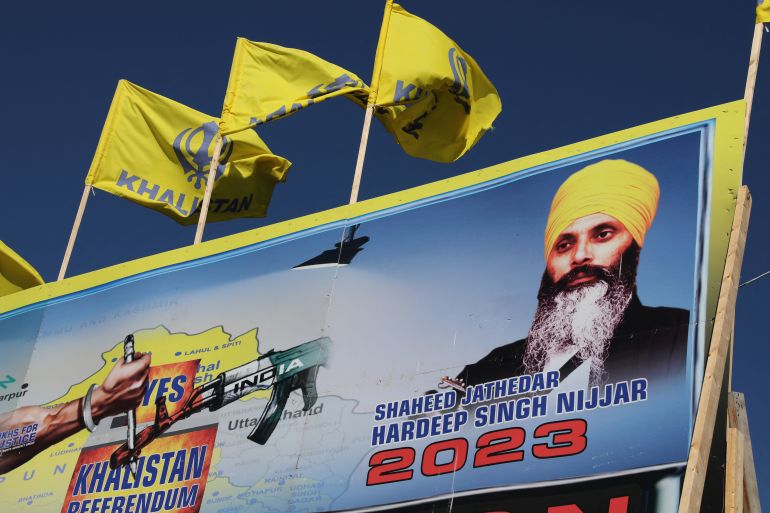Canada pulls 41 diplomats from India amid row over separatist’s killing
Foreign Minister Mélanie Joly accuses New Delhi of breaching international law with its move to revoke diplomatic immunity.

Canada has pulled 41 diplomats out of India in the latest escalation of a bitter dispute over the killing of a Sikh separatist in Vancouver.
The Canadian government made the decision to recall its diplomats after the Indian government said it would revoke their diplomatic immunity, Canadian Foreign Minister Melanie Joly said on Wednesday.
Keep reading
list of 4 itemsTrudeau’s India crisis shows he has lost control of Canada’s spies
India wants to take on Trudeau. It’s taking down its own diaspora
Trudeau apologises after Nazi honoured in Canada’s parliament
Joly said India’s threat to revoke their diplomatic immunity was “unprecedented” and violated international law.
“Given the implications of India’s actions on the safety of our diplomats, we have facilitated their safe departure from India,” Joly said during a press conference.
Joly said Canada would continue to defend international law and engage with India.
“If we allow the norm of diplomatic immunity to be broken, no diplomats anywhere on the planet would be safe. So for this reason, we will not reciprocate,” she said.
“Now more than ever we need diplomats on the ground and we need to talk to one another,” she added.
India’s Ministry of External Affairs previously called for a reduction in the number of Canadian diplomats in the country, saying they outnumbered India’s staffing in Canada.
Ottawa’s withdrawal of its diplomats leaves Canada with 21 representatives in India.
Ottawa and New Delhi have been at loggerheads since Canadian Prime Minister Justin Trudeau last month accused the Indian intelligence services of involvement in the killing of Hardeep Singh Nijjar, a prominent member of the Khalistan movement that advocates for the creation of an independent Sikh state in northern India.
New Delhi has denied any involvement in the June shooting of Nijjar, a naturalised Canadian citizen, who was wanted by Indian authorities for alleged terrorism offences and conspiracy to commit murder.
Indian officials have also accused Canada of being a base for extremism and “anti-India activities.”
The spate has led to a series of tit-for-tat diplomatic measures between the sides, including the expulsion of a senior Indian diplomat and the suspension of visa services for Canadians.
Nijjar, who became a Canadian citizen in 2015 after immigrating to the country in the mid-1990s, was shot dead outside a Sikh temple in the Vancouver suburb of Surrey in June.
Some 2 million Canadians have Indian heritage, including about 770,000 Sikhs.
India’s Punjab state was the site of a bloody decade-long Sikh rebellion in the 1970s and 1980s, until a crackdown by security forces in which thousands of people were killed.
While the Khalistan movement has lost most of its power and influence in India, it continues to have significant support among the Sikh diaspora.
Last month, hundreds of Sikhs rallied outside Indian diplomatic missions in Canada, burning flags and stepping on pictures of Indian Prime Minister Narendra Modi.